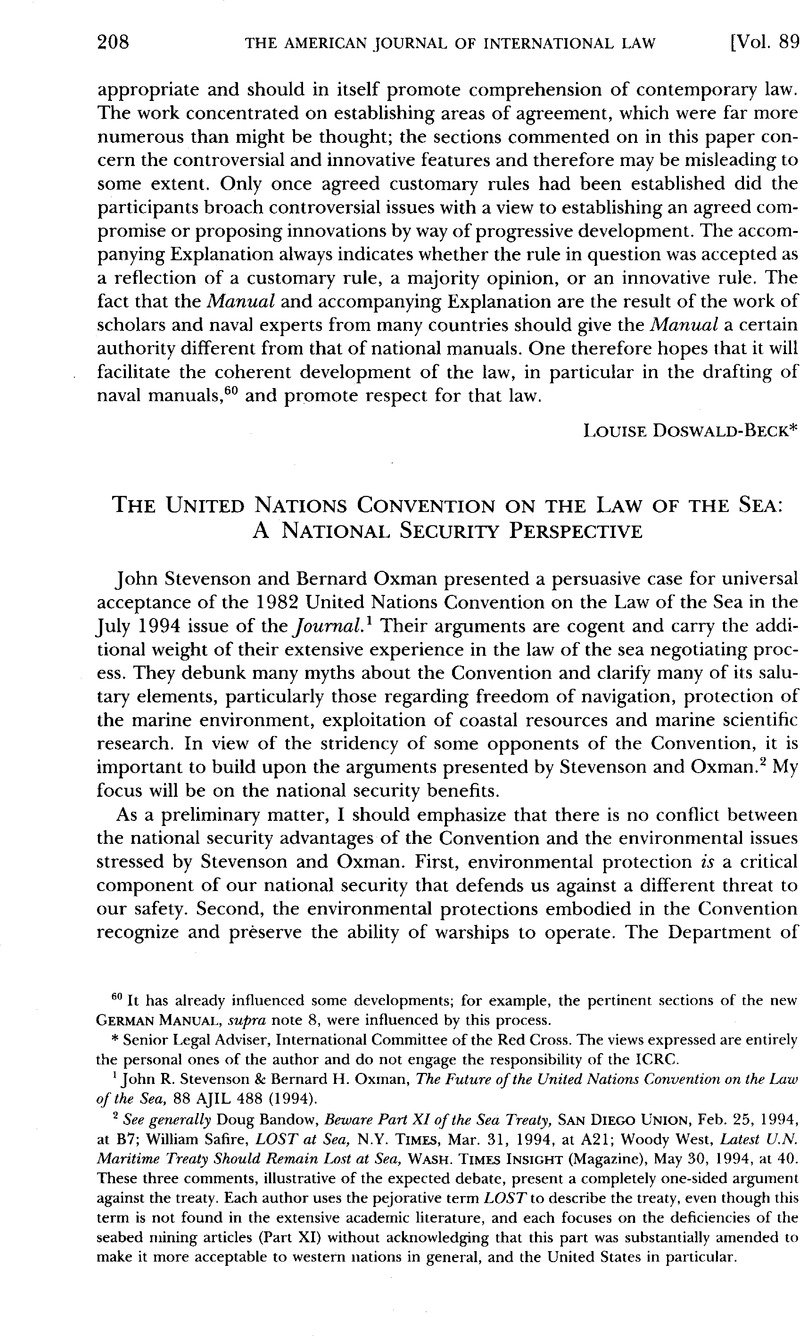Article contents
The United Nations Convention on the Law of the Sea: A National Security Perspective
Published online by Cambridge University Press: 27 February 2017
Abstract

- Type
- Current Developments
- Information
- Copyright
- Copyright © American Society of International Law 1995
References
1 John R. Stevenson & Bernard H. Oxman, The Future of the United Nations Convention on the Law of the Sea, 88 AJIL 488 (1994).
2 See generally Doug Bandow, Beware Part XI of the Sea Treaty, San Diego Union, Feb. 25, 1994, at B7; William Satire, LOST at Sea, N.Y. Times, Mar. 31, 1994, at A21; Woody West, Latest U.N. Maritime Treaty Should Remain Lost at Sea, Wash. Times Insight (Magazine), May 30, 1994, at 40. These three comments, illustrative of the expected debate, present a completely one-sided argument against the treaty. Each author uses the pejorative term LOST to describe the treaty, even though this term is not found in the extensive academic literature, and each focuses on the deficiencies of the seabed mining articles (Part XI) without acknowledging that this part was substantially amended to make it more acceptable to western nations in general, and the United States in particular.
3 U.S. Dep’t of Defense, National Security and the Convention on the Law of the Sea 4 (1994) (unpublished white paper, on file with author).
4 James Morell, The Law of the Sea: An Historical Analysis of the 1982 Treaty and Its Rejection by the United States 195–96 (1992).
5 U.S. Dep’t of Defense, supra note 3, at 4.
6 Panel on the Law of Ocean Uses, U.S. Interests in the United Nations Convention on the Law of the Sea, 21 Ocean Dev. & Int’l L. 373 (1990).
7 See, e.g., Douglas Johnston, NATO Realignment and the Maritime Component (1992); William Kaufmann & John Steinbruner, Decisions for Defense: Prospects for a New World Order (1991); Michael O’Hanlon, The Art of War in the Age of Peace: U.S. Military Posture for the Post-Cold War World (1992).
8 George Bush, National Security Strategy of the United States (1991) (U.S.G.P.O. No. SN 040-000-00561); Joint Chiefs of Staff, U.S. Dep’t of Defense, National Military Strategy of the United States (1992) (U.S.G.P.O. No. SN 008-000-00597-4). In discussing these four pillars of our national security and our national military strategy, respectively, both President Bush and Chairman of the Joint Chiefs of Staff Colin Powell placed a premium on the use of the U.S. Navy for all pillars of the strategy and along the full spectrum of circumstances from peace to war.
9 U.S. Dep’t of State, Pub. No. 112, Limits in the Seas: United States Responses to Excessive Maritime Claims 2–4 (1992).
10 Ocean Pol’y News (Council on Ocean Law, Wash., D.C.), May 1994, at 4.
11 Dep’t of State, supra note 9, at 2. This publication provides an outstanding summation of the rationale behind the FON Program, stating, in part:
Operations by U.S. naval and air forces designed to emphasize internationally recognized navigational rights and freedoms complement U.S. diplomatic efforts. These assertions of rights and freedoms tangibly exhibit U.S. determination not to acquiesce in excessive claims to maritime jurisdiction by other states. Although some operations receive public scrutiny (such as those that have occurred in the Black Sea and the Gulf of Sidra), most do not.
Id.
12 Id. at 5.
13 Elliot Richardson, Treasure Beneath the Sea, N.Y. Times, July 30, 1994, at A19.
14 Dep’t of State, supra note 9, at 5.
15 Panel on the Law of Ocean Uses, supra note 6, at 374; John Bateman, Build a WESTPAC Naval Alliance, 1993 U.S. Naval Inst. Proc. 78; Dep’t of State, supra note 9.
16 See, e.g., Morell, supra note 4, at 195.
17 Rear Admiral William Schachte, Address at the Council on Ocean Law (Feb. 19, 1993) (transcript on file with author).
18 Morell, supra note 4, at xiv.
19 Panel on the Law of Ocean Uses, supra note 6, at 373.
20 Joshua Goldstein, Long Cycles: Prosperity and War in the Modern Age 228 (1988).
21 Morell, supra note 4, at 206. Morell’s book is replete with strong statements regarding the failure of the United States to accede to the Convention. At one point, he even compares the United States unfavorably with the Soviet Union: “The U.S. policy appears to be founded on the unproven and undemocratic assumption, traditionally predominant within the Soviet Union rather than the United States, that nation-states are unable to overcome self-interest through enlightened cooperation.” Id.
22 Panel on the Law of Ocean Uses, supra note 6, at 378.
23 Robin Rolf Churchill & Alan Vaughan Lowe, The Law of the Sea 14 (1983).
- 4
- Cited by




